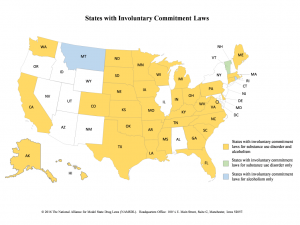Standards for committing someone
When a seriously mentally ill person is unable or unwilling to seek treatment, friends and family can use involuntary treatment laws to get the person help. The laws for involuntary commitment are different from state to state. Some states have limited laws, some have broad laws, and some have no laws. The basic standard that must be met is the person is an immediate danger to the self or to others.
The process of petition
Petition is the process by which families can ask either the court for inpatient commitment or for emergency hospitalization. Again, the petition process varies state to state. Even within a state, the right to petition for inpatient commitment might be approved while asking for emergency hospitalization is not approved. Check the laws of your state before deciding which form of petition you can use.
What does dangerous mean?
States have broadened the commitment criteria of “dangerousness” to include “grave disability” and “need-for-treatment”.
Grave disability means a person in danger of physical harm due to the inability to meet basic needs, such as food, clothing, shelter, or personal safety.
Need-for-treatment is used when a person’s mental illness prevents him from seeking voluntary treatment and, without care, will cause the person great suffering.
Length of hospitalization
A sufficient period of treatment is necessary for the committed person to stabilize. Inpatient commitment orders range from 30 – 180 days.
Court ordered hospitalization is temporary. It lasts up to 90 days.
Commitments longer than 90 days need recertification.


